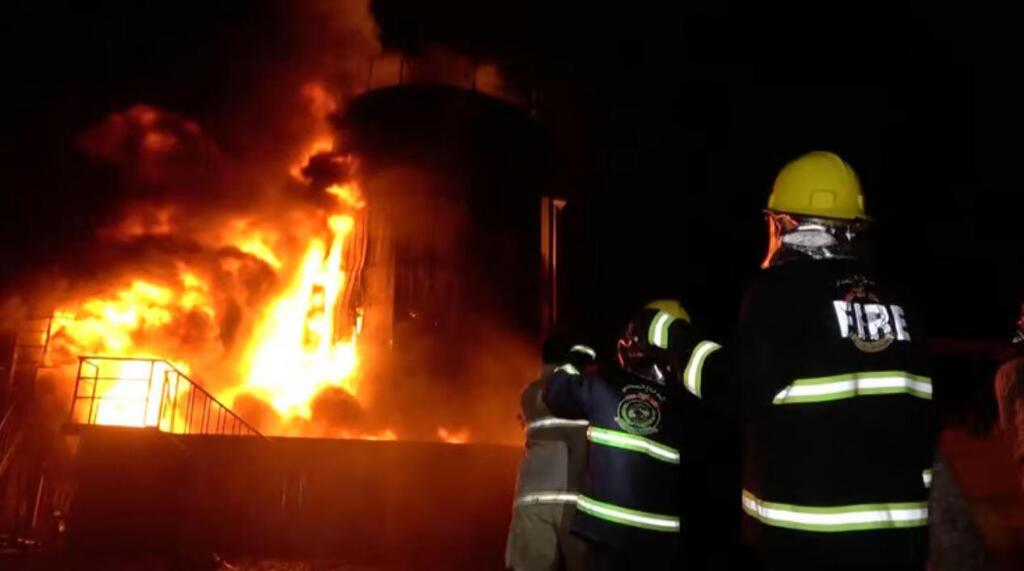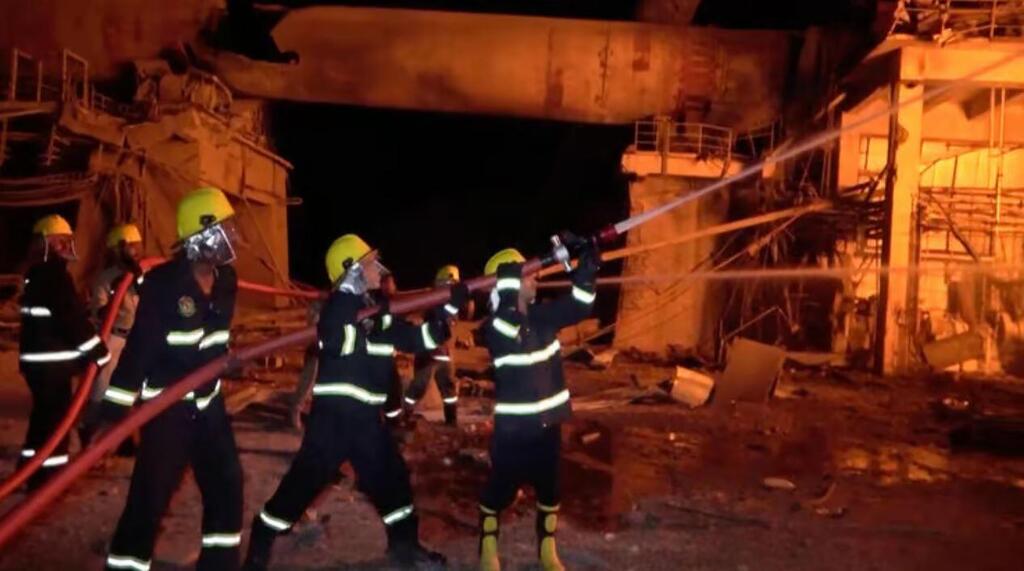Israeli airstrikes hit a cement factory in the Yemeni city of Bajil on Monday night, causing significant damage though not fully destroying the site.
Footage aired by Houthi-affiliated media showed massive fires at the site. The extent of the damage to the factory and to the nearby Hodeidah port remains unclear.
Damage in Bajil following Israeli strikes
"The Air Force’s operation against Houthi terror organization targets yesterday should not be taken for granted," an IDF official said, describing the operation as "a complex mission requiring meticulous planning, real-time management and coordination between dozens of aircraft, preliminary intelligence and various partners, culminating in a precise strike using 50 munitions in 30 seconds."
In a broadcast on the Houthi-affiliated channel Al-Masirah, a reporter described “flames” at the cement factory and mentioned casualties, including workers who were killed and others who were injured. A witness at the site questioned, "Why are they targeting us? The workers, the civilians?" Another interviewee noted that the factory employs 1,250 people and called the strike "a terrible crime," adding, "This is a civilian facility that benefits the people of the surrounding villages."
Overnight, Houthi official Hezam al-Asad, known for sharing social media posts in broken Hebrew, responded to the strikes on his account on X, describing the "Zionist-American attack on the Hodeidah port and the cement factory in Bajil" as a "despicable crime that will not go unanswered."
2 View gallery


Aftermath of Israeli airstrikes in Bajil, Yemen
(Photo: AL-MASIRAH TV/Handout via REUTERS)
"The blood of civilians and workers will fuel a severe and shocking Yemeni response," he added. "We will continue to support Gaza with faith and determination, strike deep into the enemy and disrupt its movements until the aggression stops and the siege is lifted. The response is near… painful and surprising."
A senior Houthi Defense Ministry source told Hezbollah-affiliated Lebanese network Al Mayadeen that "Houthi forces are evaluating the nature of the response to the Israeli strikes on facilities in Yemen." Yahya Dabouk, a journalist for the Lebanese newspaper Al-Akhbar, which is also affiliated with the Iran-backed terrorist group, wrote that "regardless of the expected Israeli strikes or the official rhetoric from Tel Aviv, the facts on the ground indicate that the Yemenis will not easily relent.
"Meanwhile, there appears to be no clear or unified strategic vision among Israel, the United States or regional states to effectively handle the Yemeni threat. The question isn't whether the next Yemeni missile will come, but when."
Israeli media also reported on nine strikes carried out in Hodeidah, including two that targeted the cement factory in Bajil. Military sources in Sanaa were quoted in the Lebanese newspaper as saying the Houthis are likely to escalate their attacks on Israeli airports, with plans to expand their target list to include Haifa. Since the renewal of hostilities, Houthis have launched dozens of missiles toward Israel. Most were intercepted or fell short, with only one making it through.
The Lebanese newspaper also reported that the United States carried out 25 airstrikes in Yemen on the same day, targeting Sanaa, Saada, Al-Jawf and Marib provinces. The Israeli strikes were reportedly coordinated with the United States but executed without direct American involvement.
The Israeli operation, codenamed "Port City," came a day after a Houthi missile struck Ben Gurion Airport for the first time, prompting Israel to declare an end to its restraint policy. The strikes targeted the Hodeidah port and another nearby facility, in a manner similar to previous Israeli operations in Yemen. Prime Minister Benjamin Netanyahu, Defense Minister Israel Katz and IDF Chief of Staff Eyal Zamir oversaw the operation from the Air Force command center in Tel Aviv. The entire strike was completed in 30 seconds.
Get the Ynetnews app on your smartphone: Google Play: https://bit.ly/4eJ37pE | Apple App Store: https://bit.ly/3ZL7iNv
Following the attack, the IDF reported that roughly 20 fighter jets struck dozens of Houthi terror targets in and around the Hodeidah port, located about 1,240 miles from Israel. The mission required a two-hour flight in each direction, supported by intelligence and refueling aircraft.
"The strike was in response to repeated attacks by the Houthi terror regime targeting Israel, including surface-to-surface missiles and unmanned aerial vehicles directed at Israeli territory and citizens," the military said. "The Hodeidah port is used for the transfer of Iranian weaponry, military equipment and other terror-related supplies."





